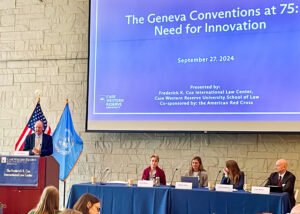 My latest law review article has just been published: “Challenging and Refining the ‘Unwilling or Unable’ Doctrine,” 52 Vanderbilt Journal of Transnational Law 245 (2019). The abstract is as follows:
My latest law review article has just been published: “Challenging and Refining the ‘Unwilling or Unable’ Doctrine,” 52 Vanderbilt Journal of Transnational Law 245 (2019). The abstract is as follows:
This Article challenges and proposes refinements to the “unwilling or unable” doctrine. Governments after 9/11 have invoked the doctrine to justify the use of force in self-defense against non-state actors (NSAs) operating within the territory of nonconsenting states. Responding to criticism that it lacked substance and a legal foundation, Daniel Bethlehem famously developed more detailed principles to embed the policy firmly in law, strike a balance between the interests of target states and territorial states, and bridge the gap between scholars and policy makers. His principles were embraced by governments as reflecting custom. The effort was laudable, but the principles fell short of their objective, and they create a risk of destabilizing the jus ad bellum regime.
This Article notes that the principles do not reflect custom, and it examines some of the ways in which they are inconsistent with the established understanding of the jus ad bellum regime. Specifically, they: lower the threshold for what constitutes an armed attack; eviscerate the temporal component from the concept of imminence, thereby destabilizing the core principle of necessity; improperly import the law of state responsibility into the jus ad bellum analysis; and undermine the independence of the international humanitarian law (IHL) and the jus ad bellum regimes. Finally, the principles do not provide sufficient guidance on how or by whom a range of key determinations are to be made, particularly regarding the “ability” or “unwillingness” of the territorial state. The principles lump all these determinations together, and suggest that they may all be made unilaterally by the target state, governed only by a single, low reasonableness standard. All of this weakens the constraints of the jus ad bellum regime more generally, thus raising the risk of inter-state war.
The Article takes seriously the operational imperatives in dealing with the threat posed by terrorist organizations, but proposes refinements to the principles to address each of these problems, so as to achieve greater consistency with established principles of the jus ad bellum regime. It develops new ideas on imminence, and drawing upon theories of self-judgment in international law, it disaggregates the decisions that have to be made and proposes differentiated standards to govern their execution and later assessment.
 Case Western University School of Law’s annual international law symposium this year focused on the question of whether the Geneva Conventions, enjoying their 75th Anniversary, need to be updated to deal with new challenges, including the application of IHL to space, expanding transnational conflicts with non-state actors, cyber-war, and the development and deployment of fully autonomous weapons systems. The conference began with a closed experts group meeting to discuss the development of a white paper on the issues, followed by an open conference with panels on each of the major topics.
Case Western University School of Law’s annual international law symposium this year focused on the question of whether the Geneva Conventions, enjoying their 75th Anniversary, need to be updated to deal with new challenges, including the application of IHL to space, expanding transnational conflicts with non-state actors, cyber-war, and the development and deployment of fully autonomous weapons systems. The conference began with a closed experts group meeting to discuss the development of a white paper on the issues, followed by an open conference with panels on each of the major topics.


